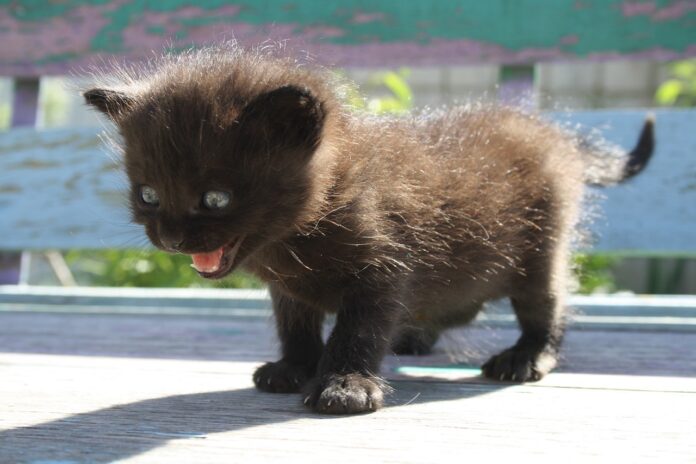Cats are often considered to be loners. They usually have a reputation for being happy when they are alone. But contrary to that, cats generally live in colonies and perform well around other cats. While often compared to dogs, cats are quite a bit discerning about their company. The term separation anxiety is often related to dogs. In reality, more feline companions like cats are affected by separation anxiety. Which results in some unusual behavior.
Signs Exhibiting Separation Anxiety in Cats
Few possible and general signs of separation anxiety in cats are
- Destructive behavior
- Not eating at all or eating too fast
- Excessive grooming
- Defecating outside the litter box
- Hyper attached to the caregiver
- Excessive crying & moaning
- Trying to escape
- Vomiting
- Over attachment with the owner (following the person room to room)
One of the main reasons a cat gets affected by separation anxiety is because of weaning too early from the mother. If you are planning to buy a kitten from a breeder, make sure that you do not take him/her away from the mother before nine weeks.
Causes of Separation Anxiety in Cats
We don’t know the exact cause of separation anxiety in cats. But various factors are
contributing to the anxiety such as a frequent change in ownership, change in caregivers’ schedules, staying mostly indoors, not having other pets at home.
Female cats are the ones often diagnosed with separation anxiety more than male cats. Genetics and environmental factors also play a role. Defecating outside the litter box is often considered to be spiteful behavior. It often means that they are trying to mix their scents with yours. Cats believe they are also helping you find your way home.
What to Do if My Cat Shows Symptoms of Separation Anxiety?
The first thing to do when you recognize the symptoms of separation anxiety in your
feline companion is, taking a trip to your vet. Cats with underlying health conditions
such as urinary tract infection or allergies may also contribute to symptoms such as
litter box mishaps, fur loss, and loss of appetite.
If your feline is diagnosed with separation anxiety some behavioral and environmental changes can help with easing the situation. Keep your cat occupied with his/her favorite toys during your departure. Forgo announcing your arrival and departure.
Provide Entertainment
Ditch the food bowl and make your cat hunt for his food by hiding it in unusual places. This stimulates their prey instincts and keeps them occupied for a while.
There are many TV shows specially designed for cats to talk to them. Keep them
occupied by feeding them in a puzzle feeder and treat dispensers. Encourage self-play
and limit social interactions.
Keep Departures and Arrivals Low-key
Quietly leave when your cat is engaged. Give them a treat while you return home.
Reward them when they stay calm and do not seek excessive attention by meowing
continuously.
Some items may trigger their anxiety such as keys, shoes, and packing for a vacation. To reduce the stress try to take your keys frequently in the day without leaving anywhere and keep them there after a while.
Put on your shoes and stay at home. Or be gone for a while and return in a few
minutes. Keep increasing the time slowly starting from five minutes.
As your cat’s uneasiness reduces, assemble your things and walk to the entryway
without clearing out. Slowly work up to strolling out for brief periods and returning,
casually welcoming your cat upon your return.
Find a Committed Cat Sitter
If you decide to stay out for a longer period such as going for a vacation, consider
hiring a sitter. A minimum of 2 play sessions a day is a must when hiring a sitter.
Make your cat’s environment more fortifying. Give lifted vertical spaces such as cat
trees, window roosts, and racking. A few cats appreciate hideaways like think boxes,
burrows, and tent beds.
A combination of manufactured pheromones, alleviating music, and an item of clothing along with your fragrance on it can offer assistance to make a calming, comforting environment.
Pharmaceuticals and Nutraceuticals
When administration changes alone are not sufficient, your veterinarian may prescribe a supplement or pharmaceutical to decrease your cat’s anxiety. Supplements can abdicate a 25% enhancement in signs. Some cats get an advantage the most by a short-acting pharmaceutical. Others do significantly well on a longer-acting medicine that remains in their body all the time. Medicines and supplements aim to create alterations to the cat’s brain chemistry.
Medications can offer assistance to cats adapting to unpleasant circumstances more effortlessly. The purpose isn’t to alter your cat’s identity or for them to be a zombie, but to be the most joyful and least-stressed version of your adored pet. Like every ailment, diagnosing and starting treatment early gives your cat the leading
prognosis.
Speak together with your veterinarian if you notice any signs that cause you
concern. Your veterinarian can offer assistance by suggesting a veterinary behaviorist in
your zone.
Do you want to share other signs of cat separation anxiety? Please leave them in the comment section.
If you’re struggling to name your cat, here are popular cat name generators.

